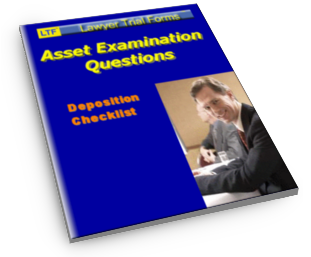When asking questions about personal assets or recent transfers to hide assets, this form’s long list of deposition questions (20 pages!) quick-starts your preparation. Plus a bonus 6 pages of legal tips and tactics for you as the attorney.
# 4014 Assets Examination Questions gives you five big items:
- A detailed, 20 page, question outline about the deponents resources. Assets Examination Questions gives you the solid detailed outline that allows you to build a hard-hitting deposition, in your situation, with confidence you are hitting the asset items you want to know about. Assets include anything tangible or intangible that is capable of being owned or controlled to produce value. That’s a lot of territory to cover in a deposition, and that means you need this detailed, multi-page- question outline.
- Emotional insurance that makes you confident! The professors in law school never taught you how to do an asset examination. Don’t be subject to a claim of malpractice because you forgot a “standard category” of questions about assets or transfers of property.) This outline checklist form is a type of emotional insurance that makes you confident as you go into the deposition!
- Pages of legal tips and tactics. Assets Examination Questions gives you tips that make you a power lawyer. For example, these Real Value tips remind you:
“.. hiding of assets after commission of a tort can be an admission of wrongdoing. See, e.g., … Harmon v. Hass, 241 NW 70 (ND 1932)(transfer of property after auto accident admissible to show consciousness of liability).”
- Improvements for your notice of the deposition. The “tips for lawyers” section of this Assets Examination Questions form gives you a list of additional ideas for your directions to the deponent to “bring with you to the deposition.” If you are taking a deposition in which you expect to ask questions about the assets of the deponent (e.g., a Rule 69 deposition of judgment debtor, or a Rule 33 deposition of a spouse in a divorce proceeding, or a Rule 33 deposition of a tortfeasor you suspect has hidden assets after the tort) — you need to add to your normal notice of taking the deposition these asset-related items to be brought to the deposition.
- Time. The benefit you always need — Time! This saves you time. Trying to create even a rough draft of these 20 pages of questions, you would spend more time and money than the mere $36 that Assets Examination Questions costs. Don’t reinvent the wheel that already exists.
Assets Examination Questions is a Triple Multiple Time and Mistake Saver. Use this form three ways:
- Use Assets Examination Questions as a comprehensive checklist of deposition questions.
- Use Assets Examination Questions as your own office checklist for potential investigation outside of formal discovery.
- Use this Assets Examination Questions as a basis for drafting a set of interrogatories. The process of drafting interrogatories will entail more customizing of the language of this form, but still the form’s 18 pages of questions will save you hours of drafting time. Or use the tips for lawyers in the bonus six pages to draft a better notice of taking the deposition on the subject of the adversary’s assets.
They never taught you how to do an asset examination in law school. So you might try a CLE course but (1) you don’t have time, and (2) CLE courses for lawyers will tell you only that if you are taking an asset deposition: “Prepare an exhaustive checklist of potential assets to use for the exam and thoroughly exam the debtor.” Unfortunately these CLE courses usually do not give you the checklist form with an exhaustive list of potential assets. You do need such a form, because of the time involved in making your own checklist from scratch. A form which saves you lots of time, and minimizes the chance you will forget to inquire on a “standard” type of asset. You add to the form, or delete unneeded items, with a minimum of preparation time by yourself.
This checklist targets the assets of an individual, not the assets of a corporate defendant of substantial size. When you are involved with finding the assets of a substantial corporation, discovery will be a matter for accountants and experts looking at books and records, not a matter of asking whether John has transferred stocks to his wife, or whether John has made a bulk sale contrary to state statutes, or what is in John’s safety deposit box. This checklist is for those times when the adverse party being deposed is an individual, or a business owned primarily by the deponent.
This is a “must-have” form for domestic relations attorneys and for an attorney doing an examination of a judgment debtor. But, as we said at the top of this page: “Assets examination is no longer just for divorce and judgment collection attorneys!” Anytime you have to depose a worried tort or contract party who may be transferring assets, you need this form, with its long list of questions about assets and transfers of assets. It’s a valuable added building block to your deposition questions.
We are selling the 27 pages of this form, Assets Examination Questions, for $36.00. Click the “Add To Cart” button to get the Assets Examination Questions, Now!


